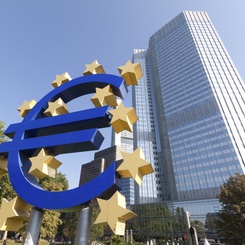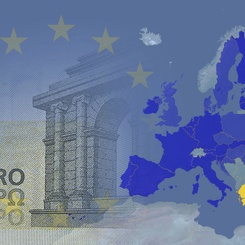André Fourçans – Distinguished Professor at ESSEC Business School, noted economist and former member of the European Parliament (1986-1999) – gives us his point of view.
Is the eurozone at a crossroads today?
The eurozone has been at a crossroads for years now but we’re at a point today where choices have to be made. If we’re talking about a choice between moving towards a more federal system or the radical solution of total disintegration, I don’t believe the explosion of the eurozone is a realistic or advisable scenario. In fact, I believe the eurozone is already progressing towards a more federal system. Many recent initiatives point to this, including the imminent ratification of the EU fiscal treaty and the proposed EU banking union which would mandate supervision by European institutions.
Admittedly, the forerunning European Stability and Growth Pact (1997) has not been successful in controlling the deficits of member countries as the implemented regulations were not respected. That said, today’s proposed fiscal treaty is different in that it is asking countries, at a national level, to make the zero deficit requirement law, even asking member countries to include as far as possible this clause in their constitutions. In other words, countries will be directly involved in implementing these regulations and hence will be more likely to respect them.
Still, I cannot say for sure how successfully these new measures will be implemented – with politics you can never be sure. However, I do think the fiscal pact and the banking union are a big step in the right direction. In fact, as a member of European parliament, I submitted a report proposing a European supervisory system of the banking sector back in 1994. I’m glad that finally, almost twenty later, we’re going in that direction.
Is disintegration still a possibility?
I don’t think the explosion of the eurozone is a realistic option. It’s easy, in an ivory tower, to say that we should go back to the way it was but in reality, disintegration would be complicated and costly. It would be costly in Europe and around the world in terms of the uncertainty that it would create – uncertainty of interest rates, of exchange rates, of inflation and of economic growth. The risk of bank runs would increase, but also it would be more difficult for some countries to pay back debt with their now devalued currency. The impact would be far-reaching and the growth rate, as well as unemployment, would certainly be negatively affected all over Europe.
Obviously, if our current banking and sovereign debt problems existed back in 1991 when the eurozone was first created, most economists – I included – would not advise moving to a single currency. But the reality today is that we are in a single currency and we must move forward, not backwards.
Will Greece leave the eurozone and go back to the drachma?
If Greece goes back to the drachma, I don’t think it will solve anything. In fact, their debt load will increase substantially because it will have to be paid in euro. Furthermore, I don’t believe a devalued drachma would stimulate exports enough since, outside of tourism, Greek exports are minimal. The real problems that need to be addressed are Greece’s huge tax evasion problem, expansive public sector and low economic competitiveness, none of which would be solved by a devaluation.
And while I don’t believe that Greece leaving the euro would trigger an outright disintegration of the zone, I do think it would create serious problems not only for Greece, but also for the other member countries. First and foremost because the departure would certainly trigger bank runs in Greece and leave open the potential for bank runs in other European countries. In France for example, many French banks have lent substantial capital to Greek banks, which would leave them open to this risk.
Would economic stimulus help create growth?
This question of creating growth is a complicated one. “Growth” is something that everyone is talking about and you would be hard pressed to find a politician or economist who isn’t saying he or she wants growth. But while some believe Keynesian economic stimulus would bring growth, I have my doubts.
A fiscal stimulus implies increasing government expenditure which increases national deficits and adds to the European sovereign debt problem, at least in the short term, which may in fact last a long time! If we’re trying to solve the sovereign debt problem, worsening it really doesn’t make much sense to me. In theory, if you stimulate you are going to increase growth, and in increasing growth you are going to diminish debt but the effectiveness of this approach is far from proven. In my opinion, this kind of wishful thinking is a dangerous game. A monetary stimulus might be more appropriate. That said, the European Central Bank has already tried this approach to a certain extent and for different technical reasons it hasn’t yet been very effective. And there is always the risk of future inflation.
Although the term austerity frightens people, measures need to be taken to reduce public debt. Simply put, the way to do this is to control government spending and decrease the deficit through a step by step process, implemented at a reasonable speed. Structural measures should also be taken to reestablish confidence in the financial markets and for all economic agents so as to give them incentives to invest and consume.
European level financial supervision will help achieve this objective. In moving towards this kind of a “federal system” it will of course take months and even years for Europe’s leaders to build the necessary institutions. That said, this process seems to be well under way. Let’s hope I won’t be proven wrong.









